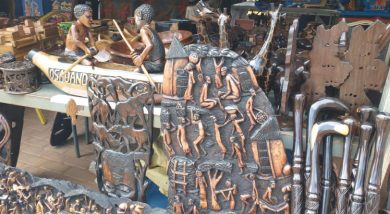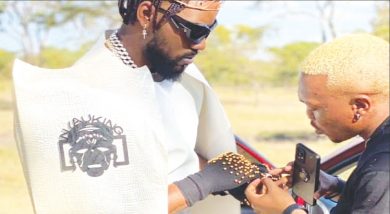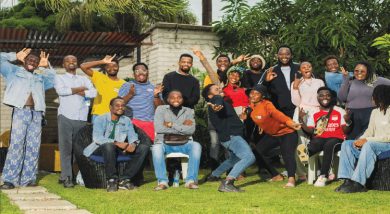Legend: Boniface Ndamera and the Lucky Stars

Like in Zimbabwe, Malawi’s music history stands out because of the hurdles the founders went through to design what is being described as Malawian music today. The late Paul Matavire was blind, but with passion and courage, he made himself relevant to the founding of the Zimbabwean music beat which is characterised by a lead guitar.
It is the same story in Malawi, Boniface Ndamera, who is also blind, together with his Lucky Stars Band is considered one of the key players of what is called Malawian traditional music. Not only that, to date, Ndamera is one of the few artists that founded and still maintains the fading Sena jive beats.
What is exceptional about Ndamera and Matavire is that despite being blind, they registered success by playing drums made of local materials from the earliest years of their life. Matavire used what is called Mbarure (an open ended paint-tin covered on one side with a plastic) as a drum. Ndamera too used tins or water containers.
Born in 1951, Ndamera has grown up having eye problems. He lost his vision when he was only four, but this did not affect his childhood game—strumming paint-tins for others to dance.
“My parents told me that when I was very young, I liked strumming materials and dancing. They said when in a group performing dance, I was always on the drums and my friends on the dance floor. This was the background of it all,” said Ndamera.
He was fortunate that there was a school for the Blind in his village. He joined Rurwe School for the Blind in Nsanje at the age of five where he did both Sub A and Sub B classes which are equivalent of Standard One and Two.
Despite learning many subjects, Ndamera says he enjoyed art and craft most. He says he could not accept to miss a music class. By the time he was finishing Sub B, Ndamera says he had made his own acoustic guitar (made of animal skin, string and wood) and was playing it with friends in the community and during sporting activities when cheering their team.
He proceeded to Bvumbwe School for the Blind in Thyolo, but did not stay long at the school because of reasons beyond his control. This was in 1970. He returned to Nsanje the same year and met late Patrick Mpatula and Raphael Banda who had an equal passion for music.
“The teaming up gave us a direction, we produced a bass guitar, acoustic guitar and some drums made of animal skin. We practised for several days at home and took to the streets to appreciate if people would love our music,” he says.
Raphael was on rythmn, he was on lead and Patrick played the bass guitar. Ndamera also played the crucial role of song composition and directing.
Ndamera says the response was overwhelming and this marked the beginning of performing music in the streets, drinking places, wedding ceremonies and other local functions.
“We used to perform popular music of the time, but we also wanted something Malawian and this is when we started to think of Utse, a traditional dance among the Sena people of Nsanje and Chikhwawa. We improved over time as we tried to convince people,” he said.
In 1971, the trio left Nsanje for Blantyre and performed in the streets. Their first stop in Blantyre was at Flamingo Leisure Centre and then Shire Highlands and Ryalls Hotel.
Ndamera says their beat was new to people in the city and because of their Sena accent, some people gave their beat names. However, he says, it was the Sena dance name that grew roots before being rebranded few years ago as Sena Jive.
Blantyre marked the new chapter for the group. Their performances attracted many people and they made a lot of money. They named themselves Lucky Stars for being recognised both in Nsanje and Blantyre and through the good collections they enjoyed more especially after the year 2000 when the group decided to record their first album.
They were lucky, some people showed interest to support them and in 2005, they recorded their debut albumLucky Stars Volume One. This is what sold their names. The album had songs such as Chinafuna m’bale which still stands out today and Unadzedze.
Five years later, they produced another hot album, Lucky Stars Volume Two and despite music being thronged by many news faces, the group registered success with the album. Songs like Wakhonda Ubale and Dzongwemade it to some music charts on most local radio stations.
They also released the video of Dzongwe and roped in dancers to spice up the group’s performances.
Currently, the band has nine members. Five are women and they are responsible for backing vocals and dancing. They are called Khulubvi Queens.
Ndamera says they are not gone, “we are currently working on our third album and once we get a sponsor, we will be in studio to record the songs. We have maintained our identity in the whole album and the beats to be enjoyed remain Utse and Likhuba which distinguish Sena from other people.”





